If you are in the retail business, then your sales team is not only the face of your company, they are probably the only employees your customers will interact with. Unfortunately, as you may already be well aware, the retail industry is known for its high turnover rates and seasonal employment. These challenges of training in this industry are well summarized by the benchmark report, Towards Maturity.
Retail has much higher staff turnover than comparable industries, so it’s no surprise to see ‘induction,’ and ‘speeding up the time to competence’ as priorities for the Learning and Development departments featured in the report. It’s also no surprise that the retail sector lags behind other industries when it comes to almost all training metrics. So how can you keep your employees well trained and prepared to deal with customers? The answer is an LMS – but not every learning management system is suited to the unique needs of the retail industry.
In this article, I’ll compare 5 of the best learning management systems for retail and outline some key features that are must-haves for an LMS. But first, let’s take a quick side-by-side look at all the LMS solutions that I consider to be the best for retail.
Best Retail LMS Software: A Quick Comparison Chart
| LMS | Type of solution | Distinctive features |
| 1. iSpring Learn | A complete LMS solution that focuses on ease of use but offers deep functionality with easily customizable options, which makes it easy to build and deliver online learning programs. |
|
| 2. TalentLMS | A cloud-based learning management system featuring easy course creation and management via an appealing interface and minimalist workflow. |
|
| 3. Tovuti LMS | An all-in-one cloud-based learning management system that gives you the tools you need to create, publish, deliver, and track the effectiveness of your online learning programs. |
|
| 4. Litmos | A centralized and automated learning solution platform. It is designed to quickly onboard new employees and provide continuous training to develop the skills of existing staff. |
|
| 5. Captivate Prime | A modern LMS with an ability to create multiple versions of content in different languages and extensive AI-based social learning options. |
|
Retail LMS Selection Criteria: Must-Have Features
There are a number of key features and functions you need to consider when selecting an LMS for retail:
- Scalable. The retail sector operates on a large scale; a business often has tens or hundreds of thousands of employees to train, across many branches, cities, and even countries. A retail organization can also grow at speed, so consider an LMS that allows you to start small without busting the budget, and scale up both features and number of users easily as and when you need to.
- Covers all training needs. Training needs in the retail industry typically begin with standard employee onboarding, then progress to training for sales assistants, cashiers, and stockroom staff. There would also often be specialized courses for other staff such as retail managers, merchandisers, and customer service assistants. A good learning management system should help retail businesses address all of these training needs.
- Flexible organizational structure. A suitable LMS platform will allow you to mimic your retail enterprise structure and hierarchy setup to deliver training to the right staff at the right time. For example, your entity structure may include regions, stores, departments, concessions, stockrooms, and other business units.
- Blended learning support. If you haven’t heard the term ‘blended learning’ before, it simply means a training solution that uses both asynchronous and synchronous training, such as e-learning modules combined with instructor-led virtual training sessions. This is increasingly becoming an essential part of most organizational training initiatives, so make sure your LMS software supports this out of the box.
- Robust reporting. You need to know the results of your training efforts, so look for an LMS that provides robust yet simple to use reporting – if it takes 2 hours to configure a report, what are the chances that you will actually use it on a regular basis?
- Mobile learning support. It goes without saying that any LMS system should support the easy delivery of mobile content but this is especially true in the retail sector where the time that staff spends off the floor is lost money.
All of the five LMSs for retail training I will cover now meet the minimum specifications I described above, so I’ll focus on the unique features of each and how they could be applied to a retail environment.
1. iSpring Learn
Rating: 4.6/5 from 133 reviews (Capterra)
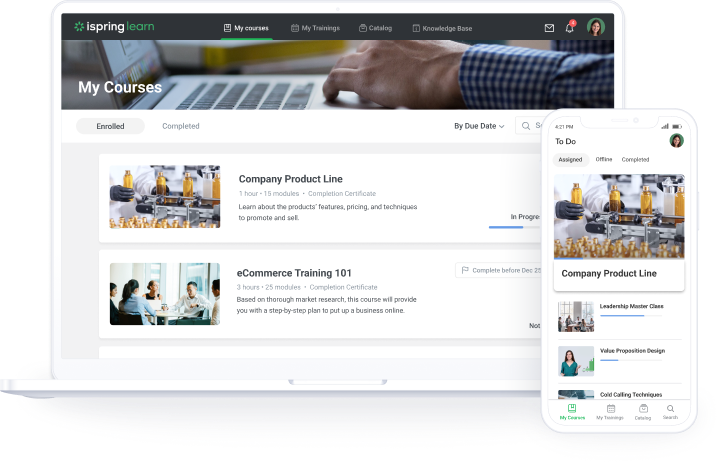
iSpring Learn is a complete LMS solution with a 30-day free trial that places a focus on ease of use but offers deep functionality with easily customizable options, which makes it easy to build and deliver online learning programs.
Deep dive
- Simple and effective user management. Retail businesses will appreciate the simple setup iSpring Learn offers, leaving no barriers to getting started. This is an LMS solution that anyone in a retail organization can pick up and leverage for almost instant ROI on training – from regional sales managers down to individual warehouse managers. The platform is cloud-based, so there are no complicated software installations, and is easy to set up and configure without drowning you in technical options.
- Well-designed interface and great UX. From a learner’s perspective, you can expect a clutter-free interface that makes accessing training a simple process. The UX and flow make it very intuitive to take courses and assessments, and later view results.
- Two authoring tools (for creating responsive longreads and interactive eLearning courses). iSpring Learn has an integrated course builder module where you can create courses with different assets like images, PDF documents, audio, videos, and quizzes. This is a welcome feature for retail businesses that want, for example, to quickly produce and push out simple but engaging courses to train retail staff on weekly product updates. But fast and simple courses are not always what is required. Sometimes your business may need to build more complex eLearning to cover larger subject areas or to address specific training needs, such as training retail staff in particular aspects of customer service. To cover this need, iSpring Learn comes with the iSpring Suite authoring toolkit. It allows you to create interactive courses, quizzes, video tutorials, and role-play simulations. Role-plays are a great way to train your retail associates on how to deal with customers in a safe-to-fail environment.
- Blended learning is well supported and easy to schedule. There is also video call integration via Zoom, so you can schedule video-based training to create blended solutions. For example, a new product training could consist of a product overview delivered via eLearning direct to staff mobile devices, followed up by a video training session conducted remotely by the product rep. To round out the functionality, there’s easy-to-use reporting that will allow you to easily keep up with key training metrics.
- Around-the-clock technical support. Also, iSpring places a lot of emphasis on quality support, so you can count on 24/7 technical support via email, chat, and phone.
Pricing
iSpring offers two types of subscription – Start and Business, with Business coming with more advanced features. The price depends on the subscription you choose and the number of learners who enter the platform during a month. For example, the plan for 100 learners/month (Start subscription) costs $2.87 per learner.
My verdict
iSpring Learn is a great LMS for retail businesses that need to both quickly create and deliver online courses and provide blended training
2. TalentLMS
Rating: 4.7/5 from 503 reviews (Capterra)
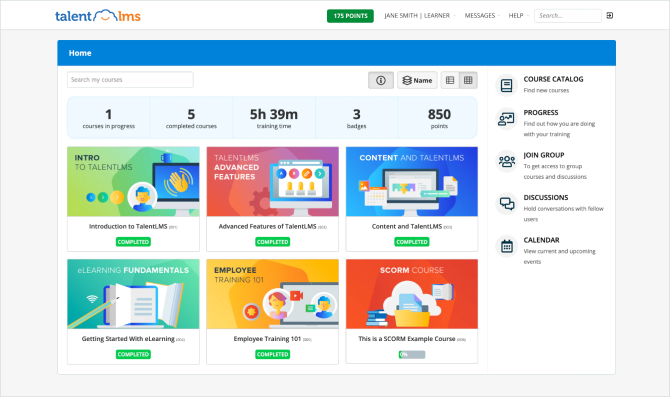
Talent LMS is a cloud-based learning management system that’s ideal for small to mid-sized retail businesses that want to train employees, sales partners, or customers with the option of scaling up if needed. It features easy course creation and management via an appealing interface and minimalist workflow.
Deep dive
- Intuitive interface layout. Initial setup and configuration of TalentLMS is a simple process that should be a cinch for nonexperts in the retail sector. However, the interface could definitely look better.
- Allows the creation of courses and quizzes in your browser. It has a basic built-in course builder that supports most standard content types like presentations, documents, audio, and images. To build courses, you can mix and match assets and assign them to learning objects that can then be used in courses. You can also build quizzes and make them a part of your course. There are five question types available. All the questions can be saved in question banks, so it’s possible to reuse them over time by simply randomizing existing questions and choosing a different set for a new course.
- Lots of video conferencing integration options. There are also various useful video integrations such as Zoom, BigBlueButton, and the Citrix Webinar suite, so there are plenty of choices to integrate live calls. If you need to schedule instructor-led training into blended courses, there is a training calendar that facilitates this.
- Social learning features. Retail businesses may appreciate the social learning features of TalentLMS that will allow staff to learn and exchange information via personal messages, calendars, and discussion forums. For example, the staff could exchange their experiences with different brands of similar products to improve product knowledge and better match customer needs when discussing products that, on the surface, seem very similar.
- Zapier support and integration with BambooHR. If your retail organization wants to link employee development and competency frameworks to training, there is integration with Bamboo HR and Zapier.
Pricing
Starting from $69 per month
My verdict
TalentLMS is suitable for retail businesses looking for a low-cost solution that also supports HR and Zapier integrations.
3. Tovuti LMS
Rating: 4.8/5 from 89 reviews (Capterra)
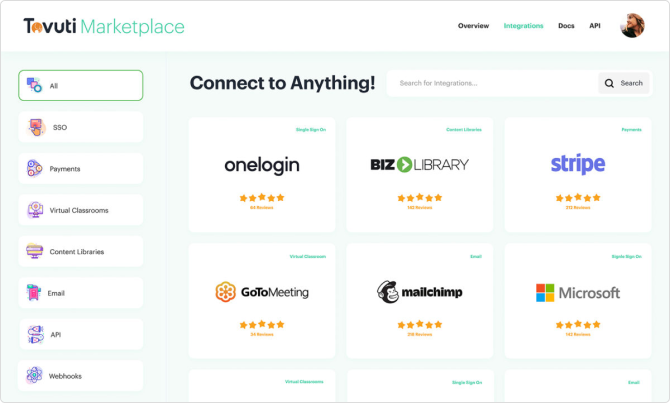
Tovuti is an all-in-one cloud-based learning management system that gives you the tools you need to create, publish, deliver, and track the effectiveness of your online learning programs.
Deep dive
- Integration with content libraries that comprise more than 7,000 courses. With built-in course authoring, you can get started building interactive courses right off the bat. There are integrated libraries that you can choose lessons from (however, this is subject to additional fees), or you can start from scratch by importing your own videos, PowerPoints, PDFs, and SCORM files.
- Virtual classroom support. Tovuti also has a virtual classroom tool to run either scheduled or spontaneous online classes that include the ability to show live video, share native uploaded videos and slide decks, use a whiteboard in real time, and break the class into separate groups. There are also event management options so you can include offline, in-person events within your training programs, build event registration pages simply, and track and report on attendance.
- Thorough automation options. The LMS provides powerful automation features for retail allowing the segmentation of learners, gating of content, auto-assignment of courses based on criteria, and the ability to show recommended additional courses to users. Also, you can geofence notifications, set up auto invites to events and live classrooms, and more. There are lots of customization options, so you’ll have complete control over your organizational branding, colors, logos, and navigation. Tovuti also allows you to create separately branded portals for your different retail departments, branches, or concessions.
- Custom KPI reports and dashboards. Standard Reporting is available in addition to the ability to build custom KPI dashboards ideal for tracking retail metrics, and you can create and share custom reports on virtually any data point within the system.
For integration and connection, Tovuti gives you multiple options featuring an open API, Single Sign-On, and connection with Zapier.
Pricing
Starting from $750 per month plus setup fee $2500
My verdict
Tovuti is an all-in-one cloud-based learning management system that gives you the tools you need to create, publish, deliver, and track the effectiveness of your online learning programs.
4. Litmos
Rating: 4.2/5 from 274 reviews (Capterra)
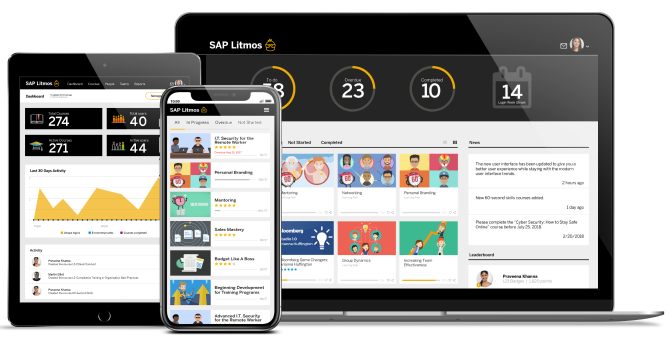
Litmos is a centralized and automated learning solution platform. It is designed to quickly onboard new employees, as well as provide continual training to develop the skills of existing staff.
Deep dive
- Highly scalable. Litmos offers most standard features that you would expect in an LMS, but its main strength will benefit larger organizations that want to deliver learning pathways to thousands of users. It allows for the distribution of learning material on a mass basis and tracking of who has and who has not completed Learning Paths. You can group a series of courses together to assign thousands of modules at a time easily.
- Easy basic content authoring. To add the learning content to the learning management software, you need to create a course and upload your files as modules. Litmos also has a built-in Quiz Editor and a Survey Editor to build tests and surveys. Aside from that, you can create simple text pages that provide on-demand information, ILT sessions, embed content from other websites, and even allows users to upload their own content on the platform, which you will then have to grade.
- Additional reports. As for reporting in Litmos, it is not very powerful and visual, but gets the job done. There are reports to track your training activities, learning progress, and the popularity of content, as well as some additional reports like Compliance Summary and Login Analytics that will demonstrate you how compliance training is going or when and from what devices employees entered your learning portal.
- Retail specific pre-built content with Litmos Heroes subscription. From a retail-specific perspective, the Litmos Courses catalog offers pre-built modules such as Meet and Greet and Fitting Room Advice. There are also many other pre-built courses that could be useful for retail staff, such as general Customer Service, Communication and Social Skills, and Conflict Management.
Pricing
The cost is based on how many active learners you have a month. Pricing begins at $900 for 150 active users per month.
My verdict
Litmos is most suitable for retail businesses looking for a combination of off-the-shelf content and basic authoring, combined with the ability to manage programs for thousands of end users with ease.
5. Adobe Learning Manager (formerly Adobe Captivate Prime)
Rating: 4.3/5 from 670 reviews (Capterra)
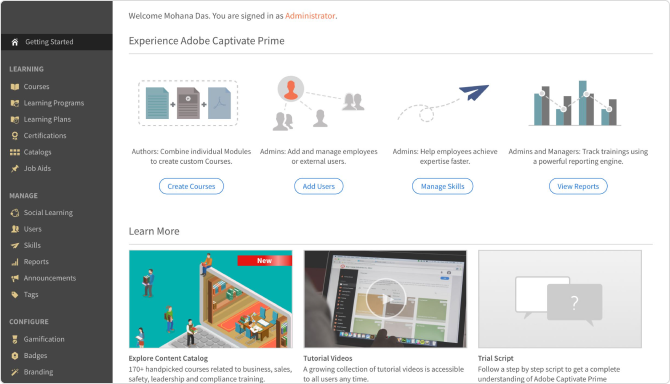
You may already be familiar with Adobe Captivate as it is a well-known eLearning authoring tool – but it’s also a part of the Adobe Creative Cloud package and a part of the Captivate Prime LMS package. In this comparison, I will focus on LMS Captivate Prime.
Deep dive
- Allows the creation of multilingual eLearning. Unlike many other platforms, Captivate Prime doesn’t have an authoring tool, though it allows you to upload the content in different formats, including SCORM 1.2/2004, AICC, and xAPI courses, video, audio, and MS Office documents. If your retail company works in a multilingual environment, you can easily create multiple versions of the content in different languages. This also applies to learning programs and certifications.
- Library with off-the-shelf courses. To those who need ready-made content, Captivate offers off-the-shelf courses, on soft skills and compliance, for example, but the price of a subscription to just one of these courses for one learner is quite high.
- Novel way to build out and assign courses. Prime provides a novel way to build out and assign programs by aligning skills to business objectives and assigning these skill-based learning plans to employees cohorts. This is a departure from the more traditional ‘learning objectives’ typically used in instructional design and could be used by non-learning professionals to conceptualize effective retail training programs based on business objectives like sales targets.
- AI-based social learning and ability to share user-generated content. A unique feature of Captivate Prime is the AI-based social learning that encourages peer-to-peer learning with automated content curation. This lets trainees share their expertise with their peers via web-based or user-generated content posted on topic-based discussion boards. An example of this could be a topic board for ‘men’s fashion sales skills.’ Other retail staff interested in similar subject areas can follow these boards to learn and even contribute to the topic, similar to a social media platform.
- Headless LMS features to deliver learning within bigger enterprise platforms. There is also a feature Captivate calls the ‘headless LMS,’ which is a capability to deliver learning in-context, within, for example, a business portal that includes many more applications than just an LMS system. Prime allows this headless version to include an embedded player in numerous different platforms, including inside salesforce.com (SFDC).
Pricing
There are two pricing models:
- Registered user pricing model depends on the maximum number of learners that can register with the platform each month. It works for situations in which you know that you won’t exceed that number. In that case, the price starts at $4/month per learner.
- Monthly active user pricing model is more suitable for organizations where the number of learners fluctuates from month to month. If that is the case, the Adobe pricing page says you need to contact them to discuss the costs.
My verdict
Captivate Prime is best for retail companies that work in a multilingual environment and businesses that operate a business portal and wish to use LMS functionality within that portal.
Final Thoughts
Sales growth and positive customer experiences are extremely important for retailers. And since retail training is focused on these results, it’s safe to say the training itself is crucial, too!
With a proper LMS, retail companies can streamline employee training and optimize performance at all levels to turn their business into industry leaders. However, not every learning management system fits the bill. I hope you gained some insights from this article that will help you when choosing your learning platform.
Do you currently use an LMS in your retail organization? If so, I’d love to know your thoughts in the comment section below.







Nice to meet you Chef! Thank you for the review!
Nice to meet you too, Ryan. You’re welcome!